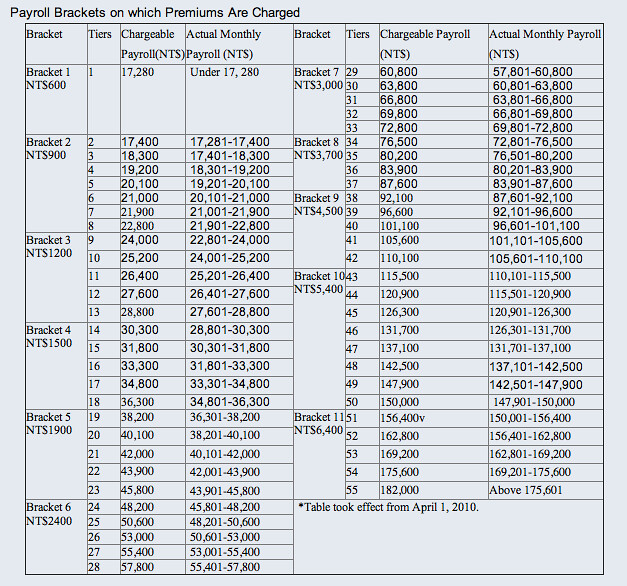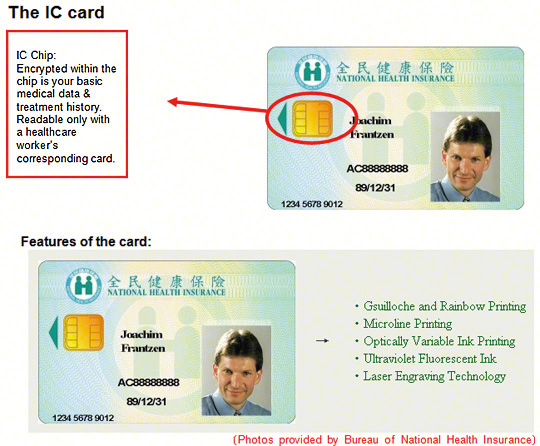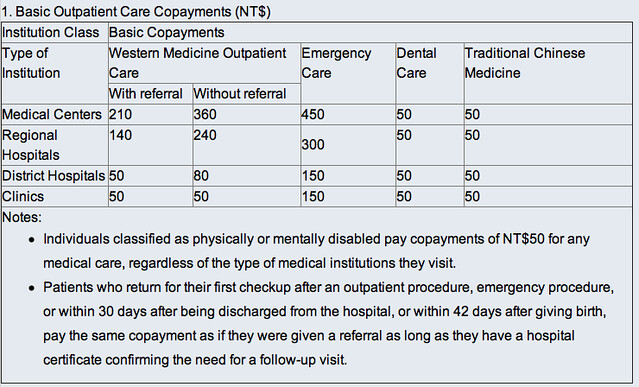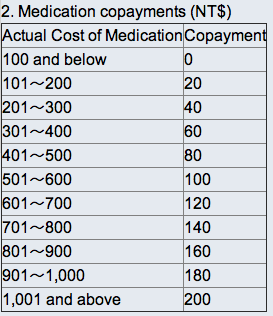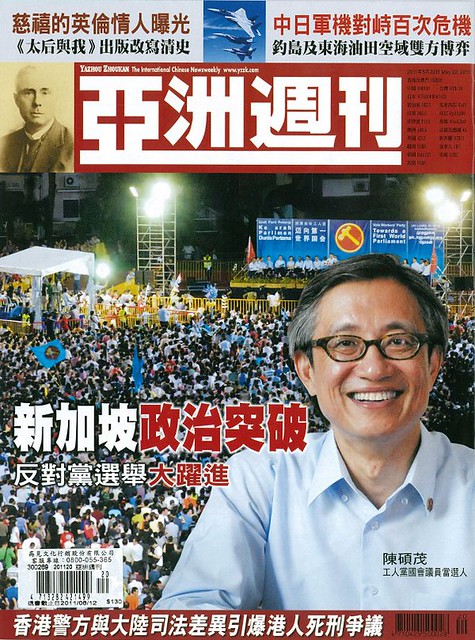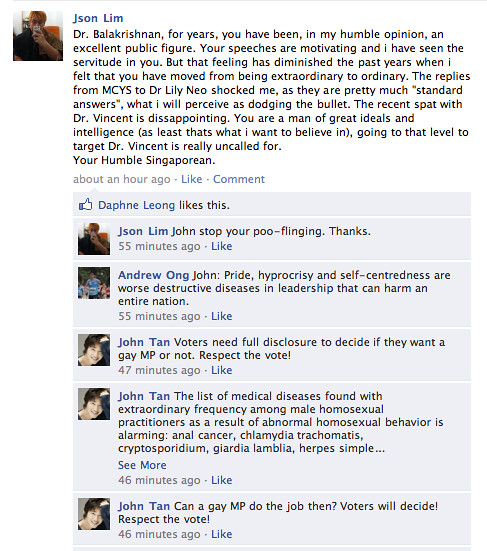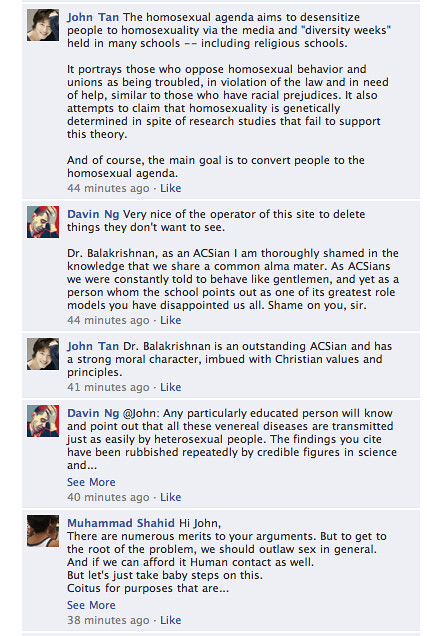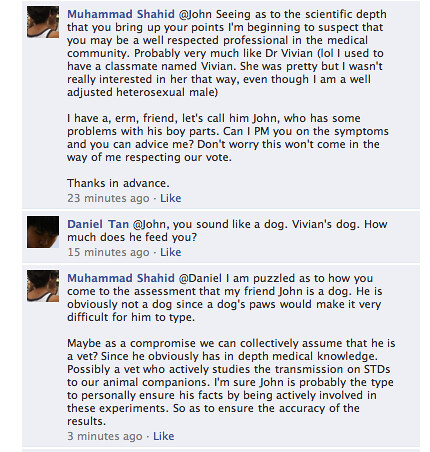I came across this post in Facebook, and would like to share it with everyone here, because the original post cannot be accessed anymore. Originally from
here.
=============================================================
"I was wrong" by Rena Tan
Sunday, May 1, 2011 at 3:16pm
For the most part of my life, I see myself as a conformist. A traditionalist. A conservative. I believe strongly in the concept of loyalty - to my friends, families and loved ones, my job and undoubtedly my country too.
I grew up feeling a strong sense of pride in the nation that has been transformed by the likes of Lee Kuan Yew and other forefathers - from a small fishing village to the multicultural first world city state that it is right now. I swell with pride too when people from other countries complimented Singapore of being a safe, clean, green and stable country, something many of us tend to take for granted, especially for the younger generations of Singapore who never had to go through the devastation of war/terrorism.
Never mind that people are laughing at us for our chewing gum policies, our tough stance on vandalism and the fact that we have campaigns to remind ourselves to be courteous, kind and gracious. At least we don't have kids running around in schools gunning down other kids, or citizens trying to blow themselves up in front of our embassies. I was steadfast in my loyalty to the country I grew up in, and I accepted the fact that although we were not perfect, our leaders have tried their best.
I believed in that for a long time. When I first became eligible to vote, I have no qualms expressing my allegiance to the ruling party. I couldn't understand why my parents and the older generation I speak to think differently. Couldn't they see how far we have come, the progress we have made, the strides we have taken and the brand we have established for ourselves on the global platform - despite being such a tiny island state? I never knew why they were so embittered, why they were always full of angst, and why they were always frustrated and emotional, especially during the election period.
I have always brushed them off as a bunch of grumpy old people who probably have nothing better to do than whine and gripe, an aging population who was always finding fault and perpetually impossible to please.
I stepped into my mid-20s and was once again eligible to vote. By then I had a job, but was struggling to make ends meet as I was laden with education debts and the need to support my family, having lost my dad at age 12. Being the traditionalist that I am, I thought it was normal for a young professional like myself to go through such struggles - as everyone around me seemed to be in the same boat. It wasn't a big deal - you just have to work hard.
I never thought to rely on the government because I believed its money and time would be much better spent on people who needed them most - the poor and destitute, the aged and lonely, and the handicapped and terminally ill. My struggles were nothing compared to these people, hence I made absolutely no demands on the government to help ease my financial burdens. I scoffed at those who complained incessantly, and assumed that they were merely a bunch of spolit brats and ingrates who had unrealistic expectations of a government who had already done so much.
My vote once again went to the people I felt then would be the best team to sustain Singapore's growth, the team who could best take care of Singapore and its people's interests.
I stepped into my early 30s and for the third time I was given the opportunity to vote. For the first time in 10 years, my belief, trust and blind loyalty to the system - started to waver. People who know me would know I worked extremely hard, depended largely on myself and am a hopeless optimist. My glass is always half full, unless you emptied it.
But at age 30, I was still struggling to make ends meet. I had no savings and I saw no way out of this low-middle class life except to work, pay my bills, pay my taxes and leave whatever morsel of income I have left for basic necessities. I started to understand why life was getting tougher, why our belts were getting tighter and why my money was always getting smaller - no matter how hard I worked or how much I earned.
In the last 10 years, the cost of living would have doubled in some areas, tripled in others. My salary only increased by a single digit percentage - supposedly to curb inflation or to offset the pain of GST. It was no longer enough to work hard. I couldn't see my money at all because they all went into the necessary living costs that I must incur just living and breathing as an ordinary citizen. Food costs, utility bills, transport costs, income tax, healthcare costs - all of which increased year on year, subtly draining me of the very little resources I have left. I started to wonder if my votes have created a money-sucking monster, and the warnings of my parents and the old people I have scoffed at previously for their lamentations and gripes, started to haunt me.
For the first time in my life I wondered - what if what they have been complaining about all this time were actually true?
Despite the nagging feeling that something was not quite right with the system, I fed the monster for the third time. Why? Because at that time, I chose to be logical and rational. The Opposition was unfortunately not united and were, I thought, an irrational bunch. Some went on a hunger strike, some lashed out at the PM in public, others were merely stirring up emotions of the people by focusing on petty issues. All I could see was the Opposition fighting among themselves and falling out with people who they were supposed to ally with to build a stronger case for themselves as to why we needed an Opposition party.
My vote of confidence hence once again went to the party I thought would let me down - less. It was probably a decision I'd live to regret for the next five years to come. The speed of growth - although good for the Singapore economy, has left me gasping for air. The bills kept piling, the taxes kept increasing, and the costs kept escalating.
I started to wonder: Why couldn't the leaders I have voted for slow down a little and see that our salaries have not grown at the same accelerated rate as the economy? I couldn't keep up. I needed a break - a significant and long-term one. Not one in the form of a $400-$500 share package for the entire year, which adds up to meagre sum of less than $2 a day. Hell no. I couldn't even take a train AND the feeder bus back to my home with that amount.
Five years have passed and once I again I find myself standing at this same crossroad - with the power to exercise my vote. This year however, I started to view politics in a very different light. I started to take it more seriously and read voraciously to help me understand the systems I have helped created with my votes. I started to attend rallys, read their manifestos, devour all the online and media reports from various alternative sources, and critically scrutinised each and every speaker on the Opposition parties - just so I can understand what they have to offer.
This time, they have not failed me. The Opposition have reconciled their differences and got their act together. I witnessed a strong sense of unison and a deliberate effort to orchestrate their campaign strategy - so that they could contest in almost every constituency. I can see the silent respect each party attributes to one another, and the consistent message all the parties try to bring across to everyone - in terms of the challenges we have been facing, the pain we are currently going through, the feelings and emotions that are raging in all of us in response to a government who seems to have stopped listening to and caring about its people.
For the first time, all the Opposition parties have put in place people I can look up to, people who have the amazing passion to make a difference, people who genuinely wants a positive change and people who wants to do it the right way. I salute each and every one of them for their selfless sacrifice - as every Singaporean knows, the path of an Opposition is one that is often fraught with difficulties, obstacles and persecution. Just like the Christian way of life.
In its pursuit of growth and profits, the system has stopped listening, stopped caring and stopped consulting. As I read stories after stories of how the financially strapped citizens were kicked around various government organisations in their quest for financial assistance; how brutal some officials were in oppressing those who couldn't afford to have a proper meal much less pay their utility bills; how families were coerced to sleep in tents on the beaches or void decks as their homes have been seized by the government for defaulting on loan payments; how some have resorted to throwing themselves in front of an oncoming train because they have no one else to turn to - my heart broke and I realised how wrong I was. I was wrong to trust that the people whom I've put in place with my votes would take care of them.
I was slapped with an even harsher reality as I read with utter disbelief, the breakdown of salaries these leaders get to earn as ministers. No wonder they were blind to the plight of the people. No wonder they were ignorant of the struggles we go through. No wonder they could not emphatise with our pain. No wonder they have lost touch with the people and were deaf to their cries. No wonder. The amount of money and power they are reveling in - have completely de-sensitized them to the reality of the lives of the ordinary Singaporean. They are no longer obligated to serve the people wholeheartedly and fight for their causes. They simply have too much to lose.
It is with a heavy heart that I write this note - to apologise for my oversight, and for feeding a monster time and again and allowing it to balloon to such catastrophic proportions. It is my folly, and I am sure the folly of many young people to come - because I was once that young, impressionable, nationalistic, idealistic, loyal and passionate voter who believed that our leaders could do no great wrong, and who could bring us to greater heights better than any other parties could.
I now know why I had a thought once, that if I ever have a kid, I will send him/her overseas - as Singapore has become too costly, too rigid, too stifling for any kid to grow up with their own voice and freedom to be creative and expressive. I never knew what sparked that thought - but I guessed like so many people, although I have felt the effects of an uncaring system, we were still in denial - choosing to believe in the best of the people we have voted for.
I have no wish to influence anyone with this note, as it was written more for myself, as a piece for my own self-reflection. But if you happen to be reading this, just know I have come one full cycle, and I have been on both sides of the fence. Know that I have read, heard and seen enough to form my perception of the system I have once trusted, and I am committed to make a change.
As a Chinese saying goes:"When a student fails, the teacher is at fault. When a kid misbehaves, the parents have failed their duty." Hence similarly, when the system turns its back on the very people it is obligated to serve, the voters who put these leaders in place are responsible.
Come 7 May 2011, I urge all of you - please vote responsibly.


